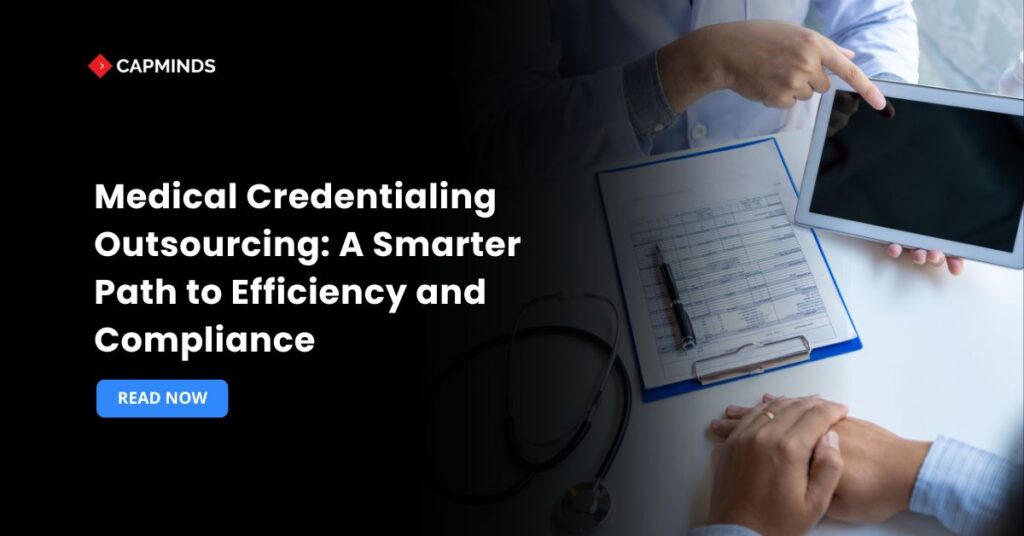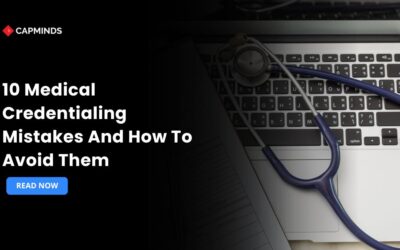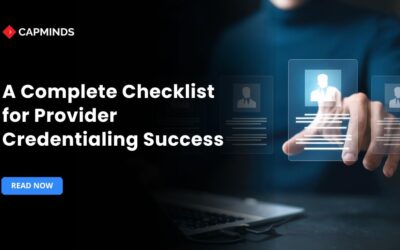Medical Credentialing Outsourcing: A Smarter Path to Efficiency and Compliance
Medical credentialing can be a complicated process that may be hard to navigate. It causes endless frustration and delays revenue cycles, and introduces the possibility of expensive compliance errors due to the manual, paper-based process.
The amount of paperwork and fluctuating demands of insurance payers and regulatory agencies may overwhelm the staff, and move resources that would otherwise be spent on patient care.
What if there was a better way? A way to not only reduce this administrative burden, but also achieve accuracy and high compliance?
The solution lies in outsourcing medical credentialing. By partnering with credentialing experts, you can be freed from time-consuming tasks and unlock greater efficiency, and improve revenue.
What is Medical Credentialing in Healthcare?
Medical credentialing is the process of verifying a provider’s education, training, licenses, and background, which ensures patients’ safety and payers’ satisfaction. It is to make sure they’re qualified to provide patient care and receive reimbursement for medical services. It is error-prone and slow when handled in-house without the right tools.
Why Medical Credentialing Challenges Hurt Your Practice
In-house credentialing often strains time and staff. Paper forms, payer portals, and repetitive outreach slow everything down. A single missing document can delay the start date by weeks.
Common pain points include:
- Time-heavy paperwork and status checks that pull staff away from patients
- Higher error rates that cause claim denials and payment delays
- Recruiting and retention issues for trained credentialing staff
- Constant regulatory updates across CMS, NCQA, and the Joint Commission
The Hidden Costs of Manual Credentialing
- Delayed Billing: It can take up to 90-120 days (or more) to get new providers credentialed, which itself prevents you from submitting claims and collecting payments.
- Denials of claims: The slightest of mistakes in paper applications is known to attract high denials and, as a result, the rework, appeal, and prolonged stalling in your cash flow.
- Administrative Burden: This needs to have staff, specific, high-paid personnel to handle complicated forms and to follow up and maintain large physical and electronic records.
- Knowledge Gaps: In-house teams might not have the specialized and up-to-date knowledge necessary to do the credentialing of various specialties and shifting state laws.
- Audit Vulnerability: You are at risk of expensive CMS, NCQA, and other accrediting agency audits because you do not have a centralized, real-time verification.
- Licensure Errors: Manual tracking may easily overlook expiring licenses or certifications and lead to instant non-compliance and service suspension.
Unlocking Operational Efficiency Through Outsourcing
1. Getting New Providers Ready for Billing Faster
- Reducing credentialing cycle time with dedicated expert teams that cut the average credentialing process from 120 days to 60 or less.
- Providers start generating revenue sooner, significantly improving your ROI for new hires.
- Experts handle various payer application formats and complex follow-ups from a single, organized point.
2. Streamline Workflows through Expert Technology
- Cloud-based tracking through advanced software for real-time status updates and secure document management.
- Technology automatically performs necessary checks and sends reminders, eliminating slow, manual steps.
- Outsourcing credentialing experts leverage established connections to process responses and resolve challenges.
3. Reduces Administrative Burden and Costs
- Eliminate the costs of staffing, like hiring, training, and retention of the specialized in-house credentialing staff.
- Make credentialing payments depending on volume or requirements, instead of maintaining a constant payroll.
- Free your clinical and administrative staff so that they can focus all their energy on patients and service provision.
Related: Transforming Healthcare Credentialing in 2025: Best Practices and Challenges
Ensuring Compliance and Mitigating Risks
1. Navigating Complex Payer Requirements
- Specialists constantly track changing state and federal regulations, such as NCQA and CMS.
- Guarantee every application meets the unique and rigid demands of each insurance carrier, every time.
- Adopt industry-leading practices to maintain the highest standard of verification quality for all audits.
2. Automated Re-Credentialing and License Tracking
- Automated systems have ensured that re-credentialing forms are submitted considerably before the important expiration dates.
- Constant monitoring to get real-time notices on expiring licenses, certifications, and malpractice insurance.
- Keep precise, centralized, and completely audit-ready records of provider records.
3. Minimizing Exposure to Audits and Penalties
- Consistent, automated checking of exclusion lists to prevent fraudulent billing and severe federal penalties.
- Establish a strong defense against payer audits with meticulous, verifiable Primary Source Verification.
- The outsourcing partner assumes the administrative compliance risk, safeguarding your legal standing and organizational reputation.
Comparison between In-House Vs Outsourced Credentialing
| Feature | In-House | Outsourcing |
| Timeline | 90 – 120 Days | 45 – 75 Days |
| Accuracy Rate | Varies by Staff Experience | Mostly 95% with QA |
| Staffing Burden | High, recruiting is hard | Low, scalable coverage |
| Compliance Tracking | Manual and Reactive | Continuous Monitoring |
| Profile Cost | Salary, Training, Software | Predictable fees, Low rework |
Finding the Right Credentialing Partner – Key Areas for Selection
- Look for experts who partner with demonstrated success across diverse payers, specialties, and state regulations. Inquire about their claim denial rates related to credentialing.
- Ensure they utilize secure, cloud-based credentialing software that is compliant with HIPAA and industry security standards like SOC 2.
- The partner must be able to seamlessly manage volume fluctuations, from onboarding a single new provider to handling large-scale expansion.
- Demand clear, real-time access to performance dashboards and detailed status updates for every provider in the queue.
Transform Your Practice with CapMinds’ Medical Credentialing Services
At CapMinds, we understand how credentialing delays and compliance risks can paralyze revenue and frustrate providers. That’s why we deliver end-to-end medical credentialing services designed to take the complexity out of the process and keep your practice financially healthy.
By outsourcing with us, you not only save time but also ensure accuracy, compliance, and efficiency at every step.
Our tailored digital health tech solutions include:
- Medical Credentialing & Provider Enrollment – Fast, accurate credentialing with top payers, specialties, and state boards.
- Outsourced Medical Credentialing – Cloud-based systems with automated reminders, real-time dashboards, and audit-ready records.
- Medical Billing Services – HIPAA-compliant billing with 95%+ clean claim accuracy and faster reimbursements.
- Revenue Cycle Optimization – Minimized denials, streamlined workflows, and improved collections.
CapMinds ensures that your providers get credentialed faster, compliance risks are mitigated, and your revenue cycle remains strong.
Partner with CapMinds today and experience credentialing services that work as hard as you do.




